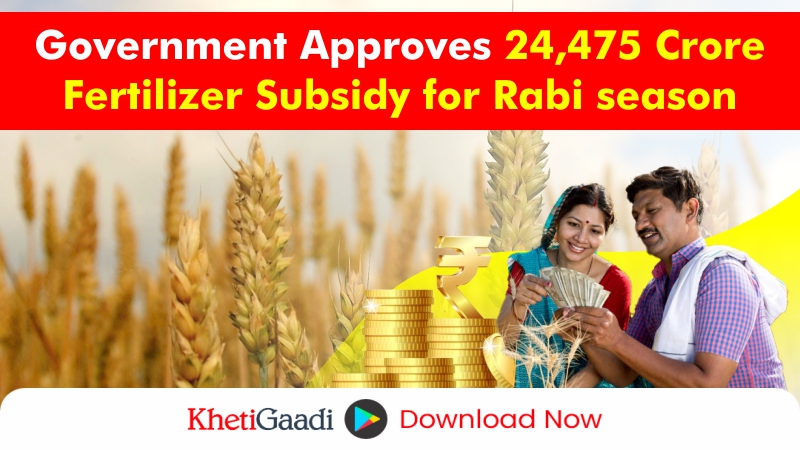Fertilizer Prices to Remain Affordable
In a significant move to support Indian farmers and ensure the availability of affordable fertilizers, the Union Cabinet, chaired by Prime Minister Narendra Modi, has approved the Nutrient-Based Subsidy (NBS) rates for Phosphatic and Potassic (P&K) fertilizers for the upcoming Rabi season 2024. The decision comes as part of the government’s ongoing efforts to stabilize fertilizer prices and provide critical support to the agricultural sector.
KhetiGaadi always provides right tractor information
Key Details of the NBS Approval
The approved NBS rates will be applicable for the Rabi season, starting from October 1, 2024, and running until March 31, 2025. The total budget allocated for this subsidy is estimated at approximately ₹24,475.53 crore. This financial support is aimed at ensuring that farmers continue to receive fertilizers at subsidized and reasonable prices despite fluctuations in global markets.
By implementing this subsidy, the government intends to regulate the prices of fertilizers that are vital for crop growth, especially during the Rabi season when crops like wheat, mustard, and barley are sown. The NBS scheme, introduced in April 2010, has been instrumental in making fertilizers available at affordable prices through a regulated system that ensures price stability.
Ensuring Affordable Fertilizers for Farmers
Under this scheme, the government provides subsidies to fertilizer companies, ensuring that farmers can access 28 grades of Phosphatic and Potassic fertilizers at controlled prices. This ensures a steady supply of key fertilizers, including Urea, DAP (Diammonium Phosphate), MOP (Muriate of Potash), and Sulphur-based products, which are essential for boosting agricultural productivity.
If you wish to know organic methods to increase your overall cultivation yield, please call KhetiGaadi counsellor on 07875114466 or write an email to connect@khetigaadi.com
The approved NBS rates for Rabi 2024 have been rationalized based on current international trends in fertilizer prices and their raw materials. This decision takes into account the rising global prices of key fertilizer inputs, ensuring that despite the increase in international costs, the burden on Indian farmers is minimized.
Benefits for Farmers and the Agricultural Sector
By providing a nutrient-based subsidy, the government ensures that the prices of fertilizers remain within reach of the farmers, preventing any disruptions in their crop production. The system allows fertilizer companies to be compensated for their products based on the approved NBS rates, guaranteeing that these essential agricultural inputs are consistently available.
This subsidy plays a vital role in enhancing the affordability of fertilizers for Indian farmers, ensuring that they can maintain and even increase their crop yields without being impacted by the rising costs of inputs in the international market.
Global Impact on Fertilizer Prices
One of the key challenges that the Indian government faces is the volatility in the global prices of essential fertilizer inputs like Urea, DAP, MOP, and Sulphur. In recent years, global prices for these materials have seen significant spikes due to geopolitical tensions, supply chain disruptions, and rising demand from various countries. These factors have the potential to increase the costs for Indian farmers, but the NBS scheme has been a vital tool in insulating farmers from these global market fluctuations.
By approving the latest NBS rates for the Rabi season, the government continues to shield Indian farmers from the impact of these global price trends, while ensuring the sustainable growth of the agricultural sector.
Continued Commitment to Agricultural Growth
The approval of the NBS rates for Rabi 2024 reflects the government’s ongoing commitment to the growth and sustainability of India’s agricultural sector. With agriculture being the backbone of the Indian economy, such policies ensure that farmers have access to essential resources like fertilizers, which are key to maintaining high productivity.
This decision also aligns with the government’s broader agricultural policies, including ensuring food security and promoting self-sufficiency in agricultural production. By supporting farmers through subsidies and incentives, the government aims to enhance crop yields, reduce dependency on imports, and secure the livelihoods of millions of farmers across the country.
Stay tuned with us on our WhatsApp channel for more real time updates on various agriculture related schemes and innovative cultivation methods aimed at supporting our hardworking farmers.
For more detailed information, visit https://khetigaadi.com/ regularly!
To know more about tractor price contact to our executive






